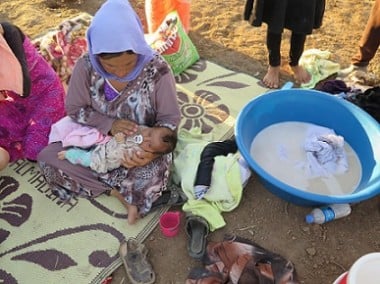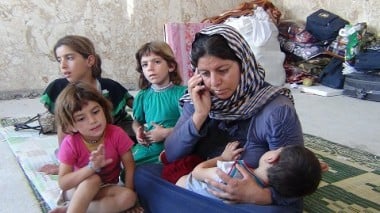

By GRACE JENNINGS-EDQUIST
The crisis in Iraq is so overwhelming and complex that it can be difficult to stomach reports from the devastated country.
It can be tempting sometimes to tune out from coverage of the crisis, what’s happening in Iraq is only getting worse.
The background to this crisis is complex, but here are few key facts that will only take a couple of minutes to learn.

Top Comments
Really they get a choice, convert, leave or die? If that's the case, why are so many dying, are you sure that's correct? Surly you'd convert or leave, I'm not religious so I don't understand the appeal, are people really choosing death over converting?
Most people are very dedicated to their lifelong beliefs and many are willing to die for those beliefs. If you've never been religious, it would be almost impossible for you to understand their dedication.
People are very dedicated to their religious beliefs. You may not be religious, but I'm sure you have some deeply held beliefs, or there's something you'd rather die than give up. Throughout history, many people have chosen to die rather than be forced to change their beliefs. There's a human right to religious freedom, and "convert or die" breaches it in the most extreme way possible.
As for leaving, unfortunately it's not as easy as it seems. Many people trying to escape have been robbed/killed on the roads.
Really? Are you that naive? Do you really think that someone who is prepared to put a knife to your throat and give you a "choice" to convert or leave will then let you go after you do their bidding? Then why did the two american journalists NOT regurgitate the propaganda given to them? I mean they had a choice didn't they? And I won't say what I really want to say now because I will be censored and this is too important, though the example would highlight the deplorable lack of intellect in your intellectual dissemination arbitrarily tossed out (in the comfort and security of your home). People are dying - arbitrarily. Let me just say that again, PEOPLE ARE DYING while we sit here debating the merits of their choices.
It's not Vicky's fault people are dying, she's just trying to understand like everyone else. Why on earth are you attacking her intelligence? This kind of response says more about your intelligence than hers.
Dear Grace,
As always, thank you.
Like all your posts on mamamia this one is concise, full of insight and specific intelligence. I have followed you for a long time on Mamamia and know how invested you are in social good. Which is why I love it when I log in and see a piece by you. Because, quite frankly, you explain stuff in simple terms that are complex and quite often difficult to understand. You are also a champion at bringing to light important issues that sometimes lack important media attention.
Thank you for the great job you do and thank you mamamia for recognising Grace's talents.
Totally agree! Grace is a massive asset to MM, and provides a much needed balance from the fun fluff.